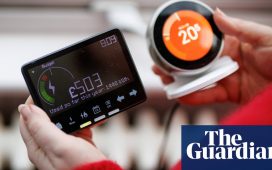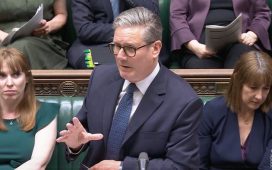Britain’s annual inflation rate remained unchanged at 4% in January despite an increase in energy bills as the cost of living crisis persisted.
Data from the Office for National Statistics (ONS) showed inflation as measured by the consumer prices index defying predictions of an increase in January, after the first monthly fall in food prices for more than two years offset the rise in gas and electricity costs.
The Bank of England had predicted a small rise in inflation last month after an increase in the Ofgem energy price cap for households across Great Britain, while economists polled by Reuters expected an increase to 4.2%.
However, food and non-alcoholic drink prices fell at a monthly rate of 0.4% in January, the first monthly decline since May 2021, driven by price cuts in January for bread and cereals, cream crackers, sponge cake and chocolate biscuits.
Against a backdrop of a tough Christmas for UK retailers because of weak consumer spending, furniture prices also fell at the fastest monthly rate in four years amid steep reductions for kitchens, leather settees, dining tables and chairs.
Last month’s better-than-predicted news on the cost of living is likely to be followed by a fall in inflation to the government’s 2% target in the spring.
Inflation was last at 2% in July 2021 and rose to a peak of 11.1% in October 2022 before starting to decline.
The chancellor, Jeremy Hunt, said: “Inflation never falls in a perfect straight line, but the plan is working; we have made huge progress in bringing inflation down from 11%, and the Bank of England forecast that it will fall to around 2% in a matter of months.”
Between December 2021 and August 2023, Threadneedle Street’s monetary policy committee raised interest rates 14 times in an attempt to ease prices pressures. The City believes lower inflation will pave the way for cuts in borrowing costs later this year.
However, the Bank has said it needs to be sure inflation is on track to remain sustainably at its 2% target, warning that wage growth and prices in the services sector of the economy could lead to inflationary pressures becoming entrenched.
According to the latest figures from the ONS, core inflation – which excludes energy, food, alcohol and tobacco, and is closely watched by the Bank – remained unchanged at 5.1%. Services inflation rose to 6.5% in January, up from 6.4% a month earlier.
after newsletter promotion
Although inflation has fallen back from the levels seen a year ago, prices for essential goods and services remain high, adding to pressure on households amid the cost of living crisis.
The ONS said that although food inflation fell on the month in January, prices had increased by 25% over the past two years – more than double the rate seen over the entire preceding decade.
Rachel Reeves, the shadow chancellor, said: “After 14 years of economic failure, working people are worse off. Prices are still rising in the shops, with the average household’s costs up £110 a week compared to before the last election.
“Inflation is still higher than the Bank of England’s target and millions of families are struggling with the cost of living.”










